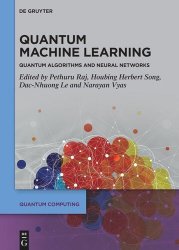Quantum Machine Learning: Quantum Algorithms and Neural Networks
- Добавил: literator
- Дата: 27-07-2024, 16:13
- Комментариев: 0
 Название: Quantum Machine Learning: Quantum Algorithms and Neural Networks
Название: Quantum Machine Learning: Quantum Algorithms and Neural NetworksАвтор: Pethuru Raj, Houbing Herbert Song, Dac-Nhuong Le, Narayan Vyas
Издательство: De Gruyter
Год: 2024
Страниц: 336
Язык: английский
Формат: pdf (true), epub
Размер: 34.5 MB
Quantum computing has shown a potential to tackle specific types of problems, especially those involving a daunting number of variables, at an exponentially faster rate compared to classical computers. This volume focuses on quantum variants of Machine Learning algorithms, such as quantum neural networks, quantum reinforcement learning, quantum principal component analysis, quantum support vectors, quantum Boltzmann machines, and many more.
Quantum computing (QC) can process calculations tenfold quicker than traditional computing by utilizing the unique characteristics of quantum bits or qubits. The three fundamental ideas of quantum mechanics – superposition, entanglement, and interference – give QC its particular strength. A qubit can store quantum information in a state of superposition, which combines all of the qubit’s potential configurations. Computational spaces can be made complex and multidimensional by using multiple qubits in superposition. These spaces allow for many representations of complex problems.
Changes to one qubit directly affect the other when two qubits are entangled. Probabilistic waves exist in an environment of entangled qubits in a superposition state. When multiple waves peak at the same result, they might compound on top of one another or cancel each other out when peaks and troughs intersect. Both of these are examples of interference. To put it succinctly, QC creates new opportunities.
This paradigm shift in computation can solve complex problems pronounced difficult by classical computers. Quantum computing is being explored across different industry verticals. High-performance computing is indispensable for high-end scientific, technical, mathematical and physics problems. These high-performance problems will be addressed easily and speedily through fault-tolerant quantum computing. Besides ensuring high-performance capability for next-generation computing requirements, QC offers significant security, blockchain, 6G communication, and AI potential. Precisely speaking, QC promises noteworthy breakthroughs in performing process optimization and enhancing the security and privacy of data transmission over any network.
Artificial Intelligence (AI), quantum computing, and 6G technologies are evolving fast to bring in a suite of evolutionary and revolutionary advancements for the information processing and communication industry. With the broader acceptance and adoption of the Internet of Things (IoT) paradigm, market researchers, analysts, and watchers estimate that there will be trillions of digitized objects and billions of connected embedded systems. When interacting and collaborating, such a humungous number of digitized sensors and actuators can easily result in zettabytes of data. QC is being presented as the way forward to make sense of such big data. The IoT devices are typically the data generator and collector; 5G and 6G in future will be the primary data carrier. AI is the modern data cruncher to emit actionable insights in time. Quantum computing is the next-generation IT infrastructure to host and run data and process-intensive AI models.
By fusing quantum computing, AI and 6G technologies, it is possible to envisage and realize newer possibilities beyond what each field can achieve individually. For 6G, quantum computing can potentially optimize network resource allocation, improve channel estimation, enhance security mechanisms, and enable advanced algorithms for intelligent network management. Furthermore, quantum entanglement’s inherent secure communication capabilities can offer novel solutions for encryption, data privacy, and secure transmission in 6G networks, succulently mitigating emerging security challenges.
Quantum computing is being proclaimed as a next-generation technology for the total society. With the faster maturity and stability of enabling theories, techniques and tools, it is safe to pronounce that quantum computing will become the new normal in the coming decades. The greater awareness, adoption, and adaptation of digital technologies (the IoT, AI, cybersecurity, cloud-native computing, 6G, etc.) has inspired national governments across the world to form special missions to fast-track the research initiatives and implementations to smoothen the path for quantum computing to flourish.
- Provides an overview of the basic concepts, preliminaries, and principles of quantum computing and Machine Learning
- Presents the most advanced and well-known quantum machine learning and optimisation algorithms
Скачать Quantum Machine Learning: Quantum Algorithms and Neural Networks
Внимание
Уважаемый посетитель, Вы зашли на сайт как незарегистрированный пользователь.
Мы рекомендуем Вам зарегистрироваться либо войти на сайт под своим именем.
Уважаемый посетитель, Вы зашли на сайт как незарегистрированный пользователь.
Мы рекомендуем Вам зарегистрироваться либо войти на сайт под своим именем.
Информация
Посетители, находящиеся в группе Гости, не могут оставлять комментарии к данной публикации.
Посетители, находящиеся в группе Гости, не могут оставлять комментарии к данной публикации.
